"Demands", Part 2
Temujin stared daggers into the face of the fat fool in front of him. He was back in his audience hall once again, seated once more upon the uncomfortable throne, receiving yet another pompous foreign dignitary. It was not a duty that he relished. The current arrogant ass was a Scandinavian by the name of Hrolfgar, from some ancient and noble lineage with extensive ties to the Viking throne - ties which he had just spent the last hour telling Temujin about in great detail. Other nations would not have had to put up with this kind of drivel, but everyone knew the weaknesses of Mongolia, and so the khan had to put up with this mindless banter. He passed the time in these interminable audiences by fantasizing about driving a spear deep into the gut of the man in front of him; with so much flesh, it would be just like harpooning a whale. Temujin chuckled inwardly at the thought.
The mindless babble began to approach a somewhat topical subject; it appeared as though Hrolfgar was finally going to announce why he had been sent to Karakorum in the first place.
"Yes, you see, the greatness of Trondheim is indeed beyond compare to any city in the known world," he droned onward, "but it could be even more beautiful. Yes, much more beautiful. If only we knew how to construct things like aqueducts and colosseums, we could make the city that much more magnificent. And you'll share with us the knowledge of Construction that you have, won't you Temujin?"
"What are you asking of me? Have out with it, man!" said Temujin, eager for this meeting to be over.
"I'm just making a reasonable request for you to share the fruits of your research with us, that's all," answered Hrolfgar. Now that the actual reason for his coming was at hand, he seemed quite a bit more nervous than when discussing the glorious deeds of his ancestors. "As one nation to another. Brother to brother, you know? I'm sure that that won't be a problem." From his expression, he certainly hoped that it wouldn't be a problem.
"Is that a threat?" asked Temujin softly, well known to be his most dangerous tone.
Hrolfgar mopped his consierable brow with a silk hankerchief; sweat had begun appearing on his face all of a sudden. "No! Not a threat, not at all," he answered nervously. "No threats between such friendly nations. But surely you must, ah, recognize the reality of your political situation. Scandinavia is a mighty country, the largest in the world, and when King Rangar requests a, err, gift from you it would not be, ah, polite to refuse."
"We paid good money to Arabia for those secrets, and I will not give away the knowledge of Mongolia so easily," replied Temujin, rising to his feet from the throne. "Ragnar should know that we do not subscribe to blackmail here in Mongolia. And as for you... well, Scandinavia is a long way away from Karakorum." And for the first time that day, Temujin smiled.
That was when Hrolfgar really began to sweat.
A short time later, as the audience hall was being cleaned of the mess that inevitably came with such public demonstrations, an aide spoke up to Temujin on the certainty of war. The khan laughed. "Let them come! The Romans will keep most of the heat off of us. As for what does come, I'm off for the northern frontier to attend to matters personally. And," he continued, "it was important to show the rest of the world that we are not a doormat to be walked upon whenever they feel like extortion."
"Isn't that right?" he asked, raising his voice to carry throughout the hall to all of the notable persons gathered within. They all solemnly nodded their heads in assent - not that anyone would have been in the mood to disagree with Temujin considering what had just happened.
* * * * *
The cool breeze blowing through his dark hair was a refreshing relief from the sweltering heat of the jungle; all too quickly it was gone, causing a fresh trickle of sweat to run down Temujin's forehead. He was where he always served best, among his soldiers in the frontier town of Hovd, the most likely target for the Scandinavians to attack. They had tried it in the earliest days of the war, sending a force of archers against the city walls, only to be driven off and destroyed miraculously by a small contingent of local militia. The khan had already given a speech in their honor and planned to erect a statue of the hometown heroes at some later date - when funds were not so tight. For Hovd was not just any ramshackle frontier trading post flying the banner of Temujin's Fist; it was also the location of the nation's only iron mine. Even as he stood here on the walls of the town gazing out to the horizon, he knew that somewhere far to the south worker gangs were building a great road through the jungle to connect the iron mine to the rest of the country and enable the construction of deadly new weapons. When that day came, Mongolia would cease to be a laughingstock among the nations of the world.
"There's another one, sir." The spearman on his right pointed out into the deep jungles, and Temujin squinted to follow the direction of his arm. His eyes weren't as good as they had been in younger days; now where were they? Ah - there! Out amongst the trees he saw a sudden flash of color, there and then gone in an instant. The boy was right; they were indeed outside the city waiting for the moment to strike.
Later that night he met with his advisors in the local town hall, which was little more than an overgrown barn usually used for storing cattle. Even right now there was still a light covering of hay over the dirt floor, and the place stank of manure. Temujin didn't care; the place suited his purposes.
"We know from our scouts that there are Scandinavian forces out there in the jungles, and quite a lot of them unless our estimates are wrong," he began. "What would you propose we do about it?"
"My lord, I don't see any alternative but to surrender the town," answered Chagatai. He was Temujin's third and youngest son, although neither acknowledged it in the formal councils; a good diplomat with many political uses but not a fighter. "It's simply a matter of numbers; they've got us nearly surrounded and outnumbered at least two to one. Maybe more than that by now. When they attack, it won't be a battle - it will be a massacre."
"Baah! You never had the balls for a siege Chagatai, so shut your mouth and keep quiet!" That was Ogodei, the khan's oldest son. Always full of bluster and eager for a fight, Temujin frequently thought Ogodei what he himself would have been like had he not learned the need for diplomatic tact at an early age. "We can hold those dogs out for a dozen years if need be, right Jochi?"
The recipient of that question was Temujin's middle son, the fourth and final member of the council that mattered. There were other aides and such present, but they were nothing more than underlings that would agree to whatever the main leaders decided. Jochi was a silent man, much given to introspection, who rarely spoke and never let what he was thinking appear on his face. Of the three, Temujin thought his middle son the most dangerous by far. As was his want, Jochi merely smiled at his brother's question and looked pointedly at Temujin, indicating that he yielded the floor back to the khan.
"Chagatai, you have to learn something," said Temujin. "It's one thing to negotiate with other peoples; I'm willing to do that from time to time because I know it's in the best interests of our nation. But it's another thing entirely to bend down in the dust and lick the feet of our foreign oppressors!"
"But Father!" interrupted Chagatai, leaping to his feet.
"Never cut in on me when I'm speaking!" roared Temujin, standing as well. He was almost a head shorter than his son, but the younger man cringed back all the same at the naked fury in the khan's eyes. "We do not surrender to threats. Ever! Do you hear me?! They will talk with us and ask for peace, mark my word."
Already on his feet, Temujin dismissed the meeting by walking out of the barn, calling back over his shoulder as he did so. "And if you ever call me by that name again while we're in formal council, I'll kill you myself."
Discipline could be harsh in the family of the great khan.
* * * * *
Day after day passed outside the city of Hovd, and every night the number of campfires they could see out in the steamy forests grew greater. Temujin took to pacing the walls of the city endlessly, his nerves on end from the tension. As every day passed without word from the Scandinavians, he became visibly more and more tense, like a cork screwed tighter and tighter into a bottle. Doubts began to creep into his mind, a feeling completely alien to the khan who always seemed impossibly sure of himself and his own actions. Had he made the right decision? Maybe he should have considered abandoning the city to save the rest of his civilization. But... no! Hovd was the location of his only iron mine, the keystone of his entire carefully laid plans. This place among all others he must defend to the death.
A booming sound went up from the jungles, the noise of hundreds of war drums beating in unison. Whoops and cheers could be heard echoing between the trees as the Viking hordes began their advance on the city. Temujin swore and grabbed the nearest aide, issuing forth a stream of directions on how to prepare the city for imminent attack. Within moments, the town was bustling with activity as men everywhere grabbed their weapons and prepared to take positions on the wall. They were not on the whole a very promising lot, however; some men were armed with fine spears capable of stopping a determined assault, but most of the city was to be guarded by local militia with no equipment better than rough stone axes. Out of desperation, Temujin had armed many of the local women as well, but he didn't think it would do much good in the end. When the Vikings came in numbers, the walls would be overrun and the streets would flow with Mongol blood.
On they came, the foreigners decked out with shiny swords and with their faces painted in bizzare patterns of runes incomprehensible to the Mongol defenders. They could be easily seen through the trees now, thousands in all, far too many to stop. Temujin fingered his fine sword and prepared to die gloriously in battle.
Out of nowhere the silvery note of a trumpet sounded across the battlefield. Everyone present, Viking and Mongol alike looked around confusedly for the source of the sound. The call came once, twice, then a third time - and, shockingly, the Scandinavians began to retreat back into the jungles. His aides looked at his in befuddlement and Temujin smiled back confidently, but in reality he had no more idea what was going on than they did. Why retreat now when victory seemed to be at hand?
The mystery soon revealed itself in the presence of a messenger of the Scandinavian court, who called off the armies and was ushered in to talk with Temujin along with the Viking commander Erikk. He annouced that he was prepared to offer a peace treaty with the Mongols, provided a pittance of gold was kicked in along with the deal. Temujin was more than happy to oblige.
"But, but..." sputtered Erikk to the effeminate ambassador, "I'm about to run over the city here. There's no need to make peace, we're about to win! Give me another day and I'll reduce this city to rubble!"
The ambassador sniffed at the mud-stained uniform of his fellow countryman. "I'm sorry, sir, but my orders come directly from the king himself, so I'm afraid you're outranked. And Ragnar explicitly sent me here to ask for a fair and just peace, which Khan Temujin is prepared to offer. Your barbaric actions have no place here."
"If Ragnar were here, I'm sure he would side with me," shot back Erikk in barely restrained tones of anger.
"Well he's not, so I guess we'll have to do things the 'civilized' way," beamed Temujin back happily. After the meeting had concluded and the Scandinavians shown their way back, all of the Mongols had a good laugh at their ineptitude of their foes. "That's bureaucracy for you!" chuckled Temujin over a mug of good home-brewed beer. He slapped Chagatai on the back, nearly sending his son to the floor. "Didn't I tell you they'd talk to us? And for the last time: we Mongols don't give in to demands!"
EG2 550BC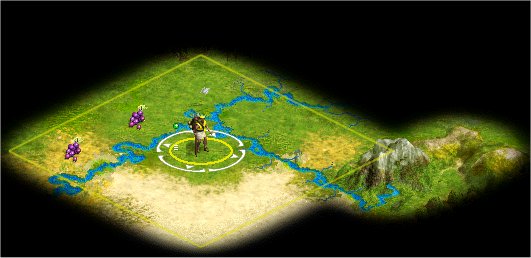



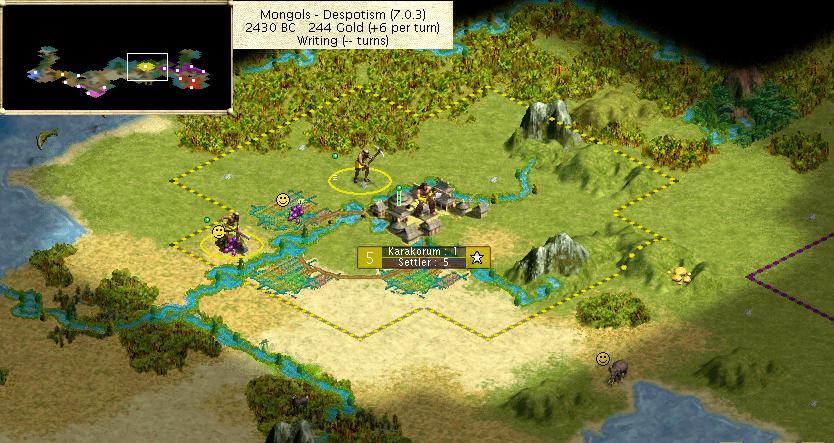
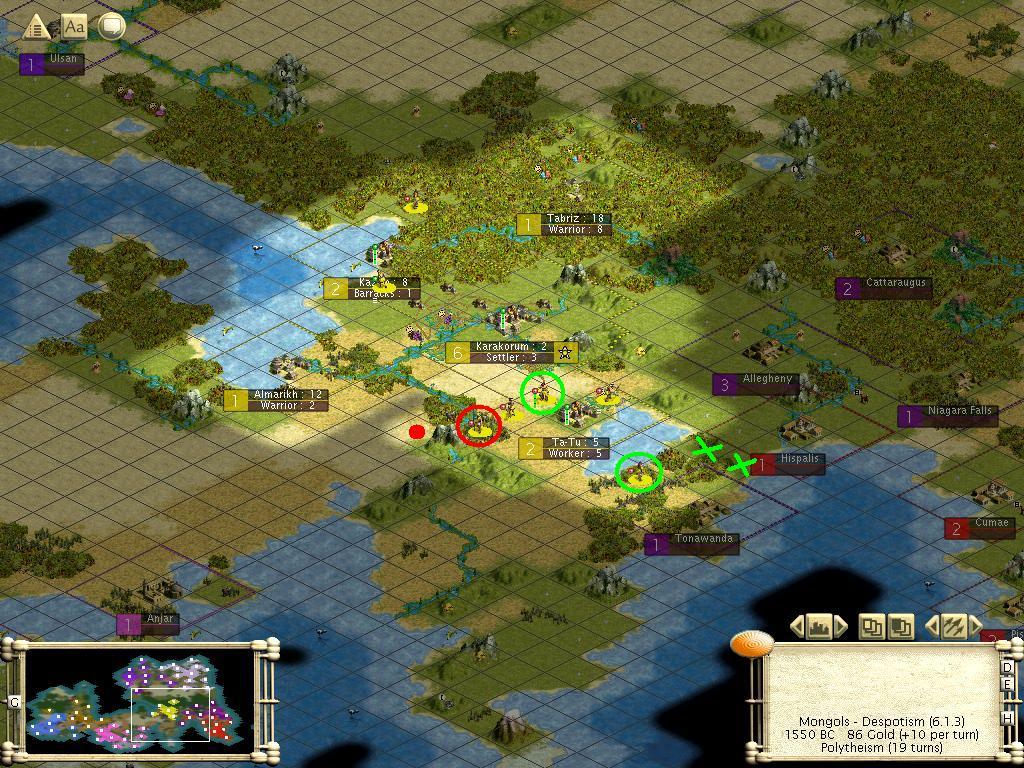
 Will get to it as soon as I can, hopefully sometime tomorrow - but maybe not.
Will get to it as soon as I can, hopefully sometime tomorrow - but maybe not.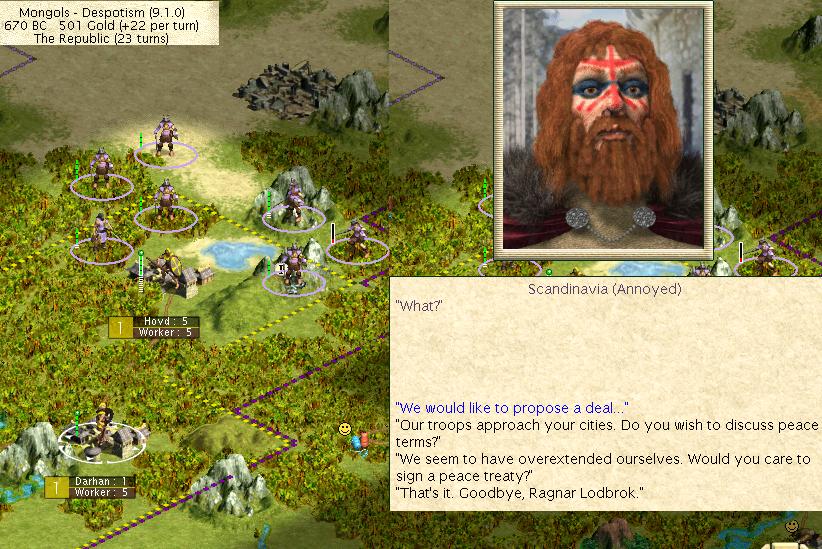
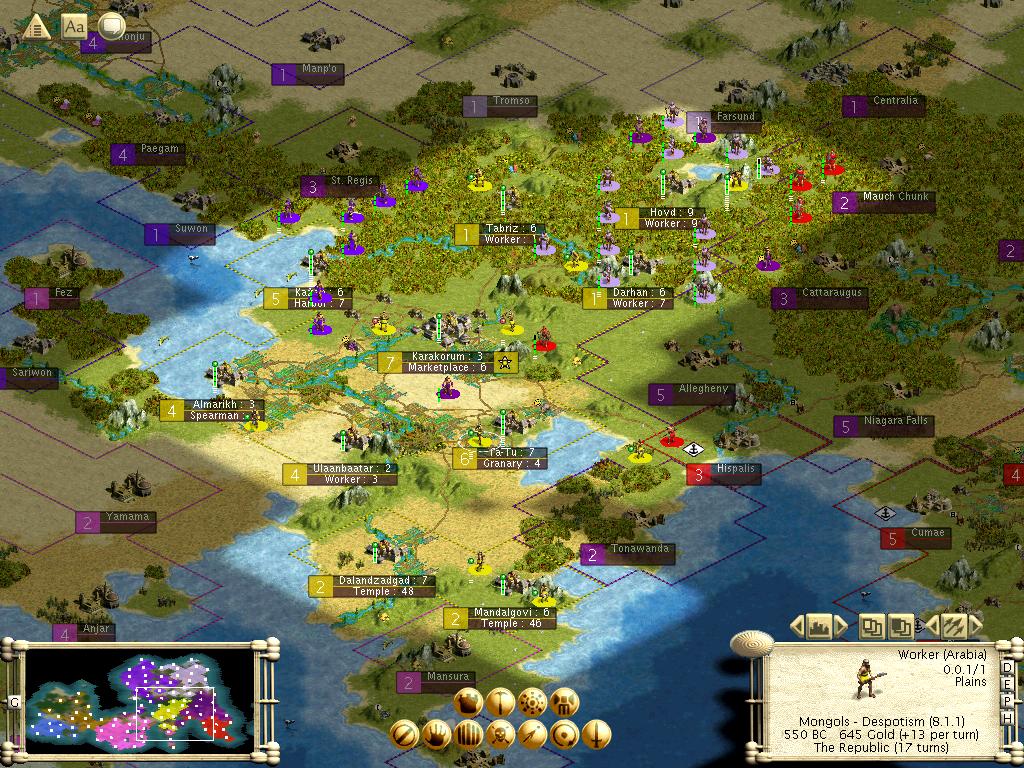
 Elite Sword kills spearman but does not spawn great leader.
Elite Sword kills spearman but does not spawn great leader.